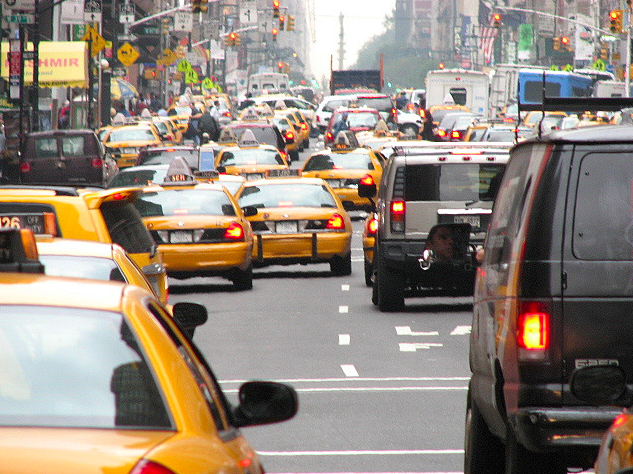Since the de Blasio administration attempted to cap for-hire cars this summer, the debate over Manhattan traffic has gotten louder, but not more productive. Uber claimed it definitely wasn't the problem. Some council members wondered if bike lanes were slowing down cars. Amid all the noise, something important got lost.

At a hearing about Manhattan traffic this morning convened by Borough President Gale Brewer, a simple consensus emerged: The fundamental issue is the limited amount of street space in the Manhattan core and the practically unlimited demand to use it. Unless New York puts a price on roads, traffic congestion is going to remain intense.
"We can't unsnarl our streets unless vehicles that take up the space on the street are charged a price. Otherwise, the space that we clear out today -- by capping tour buses or Uber cars or 18-wheelers -- will be filled tomorrow by other vehicle owners," said transportation economist Charles Komanoff. "And the price needs to apply to all vehicles... based on the space that they take up. Because space is a finite resource."
“The least efficient mode of transportation is the single-occupant car," said "Gridlock" Sam Schwartz, who in addition to his Move New York toll reform proposal, backed the elimination of parking placards for most government employees. "There is no reason to be parking for free on the most valuable land possibly on Earth."
Others proposed more aggressive ideas, like banning personal cars completely. “Private vehicles coming into Manhattan is insanity,” said Steve McLoughlin, an organizer with the International Association of Machinists and Aerospace Workers District 15, a union for black car drivers. “I don’t think that Manhattan can handle much more than the professional drivers, than the trucks that are necessary to supply our businesses, and the first responders.”
McLoughlin, who commutes from Monmouth County each day, backed Move New York toll reform as a step in the right direction for reducing congestion.
Uber also backed Move New York, which would include surcharges for taxi and for-hire vehicles below W. 110th and E. 96th streets. (The Metropolitan Taxicab Board of Trade, which represents medallion owners, backs the plan too.)
"There are many potential solutions to congestion," said Uber's Nicole Benincasa. "The Move NY fair plan and congestion pricing is a very smart idea."
The only path forward for Move NY runs through Albany, where Governor Andrew Cuomo has repeatedly rejected it. Meanwhile, the city is working on its own for-hire vehicle congestion study, setting the stage for what the mayor says is a "new deal" that will "rationalize the whole picture" of taxi and for-hire regulation.
Right now, the "whole picture" of the industry isn't completely clear.
The Taxi and Limousine Commission doesn't know the extent to which app-based trips are replacing traditional street hail trips or increasing overall demand for car travel, said TLC special advisor Bill Heinzen.
Complicating matters, TLC receives more data about yellow and green taxi trips than it does about for-hire vehicles, which only have to tell regulators where and when they pick up passengers, not where the trips end or how long they last.
"Ideally, all TLC-regulated vehicles would provide complete trip and fare data to the TLC on a regular and unmediated basis," Heinzen said. "We have a lot of data, but we are always looking for more information."
Uber said that it in addition to the data already required by TLC, it will soon give the city requested information on the time, distance, and endpoint of each trip. There's a catch: At the city's request, Uber said, the data is aggregated by hour and by taxi zone, an approximately zip code-sized area the commission uses to aid number-crunching. The records, which won't be released to the public, are being used as part of the city's congestion study, expected for release in November.
Today, Uber released its own report claiming the city's study should take at least a year [PDF]. That earned a rebuke from City Council Transportation Committee Chair Ydanis Rodriguez, who criticized Uber for agreeing to give data to the city's fast-tracked study, then turning around and badmouthing the timeline it had previously supported.
When it comes to a long-term fix for New York City congestion, of course, the sniping between City Hall and Uber is a sideshow. The main event is in Albany, where Governor Cuomo and the legislature have the power to untangle the city's traffic mess.
Stay tuned.
Update 6:30 p.m.: An earlier of this story reported that Uber had already shared additional trip data with the city. Uber says it has reached a data sharing agreement with the city and will be sending those records to the city imminently.





